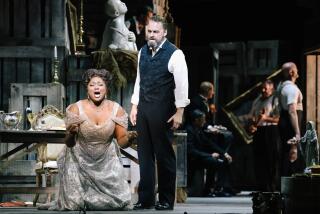A Tenor Who Is Moved by Music
- Share via
British tenor Ian Bostridge, 35, is one of the new leading lights in the recital world.
But unlike other singers, Bostridge wants to have the freedom to move around a bit when he makes his recital debut at 8 p.m. Thursday in Costa Mesa.
“The framework you work in is restricted,” he said recently from Los Angeles during a break in rehearsals for Britten’s “War Requiem” with the Los Angeles Philharmonic.
“You’re not supposed to make hand gestures. Your face is supposed to be the focus. But I think moving around in that small space around the piano is important in engaging the audience.
“It’s really nothing planned or laid out. At certain points, you allow the music to move you.”
“A lot of the power of music,” he added, “is its ability to make you move through rhythms. In classical music, audiences keep still. I think there is a counterpoint between stillness and movement which can underline certain emotions and help draw the audience in.”
A native of Streatham in South London, Bostridge didn’t aspire to become a professional singer, although he had appeared as a boy soprano in the children’s chorus of Massenet’s “Werther” with London’s English National Opera.
Aiming for an academic life, he made a promising start. He studied philosophy and history at Oxford, got a master’s degree at Cambridge and a doctorate back at Oxford in 1990.
His dissertation would be published as “Witchcraft and Its Transformations, 1650-1750” in 1997 by Oxford University Press. Rather than a collection of case studies and anecdotes, it was a scholarly tome on how statutes on witchcraft were a legitimate part of criminal law in 1650, but not a century later.
During his final year at Oxford, he met his wife, Lucasta Miller, a former literary editor at the Independent. They were married in 1992.
But as many graduates were discovering those days, even for those with such prestigious credentials, academic jobs were hard to come by. So Bostridge began working as a researcher and producer for business and science documentaries for a TV studio in London.
He had started taking his first singing lessons while a graduate student and began giving amateur performances for friends.
But things suddenly got more serious when he drew critical notice after making his opera debut at the 1994 Edinburgh Festival in the small role of Lysander in Britten’s “A Midsummer Night’s Dream.”
A year later he won the Royal Philharmonic Society’s Debut Award. He was on his way.
He decided to embark on a full-time career as a singer in 1995, concentrating on lieder (German art song), rather than big operatic roles. He now has recorded on more than 30 discs music from Bach to Michael Nyman.
But he has also begun treading the boards, most recently Deborah Warner’s 1999 controversial South Bank staging of Janacek’s “The Diary of One Who Vanished” for the English National Opera and the Royal National Theater.
In his Southern California recital debut, he will perform lieder by Schubert and Wolf.
The dozen Schubert songs will include “Erlkonig” and “Der Musensohn.” The Wolf selections will be chosen from the 53 “Morike Lieder.”
Bostridge sees a connection between the two and a link from Schubert through Schoenberg.
“Both Schubert and Wolf are great harmonic experimenters,” Bostridge said. “We’ve become very accustomed to the music of the early romantic period. It sounds very natural to us. But Schubert created it. To his contemporaries, his harmonies sounded outrageous.
“Wolf carried on that tradition. That’s true up to the first work of Schoenberg that veers away from diatonic harmony and goes to atonality, ‘Der Buch der hangenden Garten.’ Song has always been pushing at the harmonic limits.”
SHOW TIMES
Ian Bostridge will sing a program of Schubert and Hugo Wolf at 8 p.m. Thursday in Founders Hall at the Orange County Performing Arts Center, 600 Town Center Drive, Costa Mesa. $40. (714) 556-2787.
*
Chris Pasles can be reached at (714) 966-5602 or by e-mail at chris.pasles@latimes.com.
More to Read
The biggest entertainment stories
Get our big stories about Hollywood, film, television, music, arts, culture and more right in your inbox as soon as they publish.
You may occasionally receive promotional content from the Los Angeles Times.










